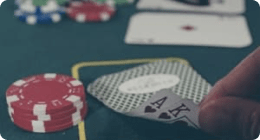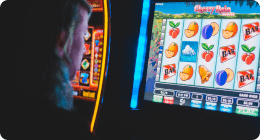How Gambling Addiction Affects You
There are many ways problem gambling can have a negative impact on your life. On this page, we’ve provided a few questions to help you check if you or someone you care about may have a problem, and advice on how to help them. You’ll also find stories from people who have overcome their issues, as well as information on types of addiction and different motivations for gambling.
Are You Gambling Responsibly?
There are a number of things you can ask yourself if you’re worried about your gambling habits, or those of someone close to you…
- How often do you play for more than you can afford to lose?
- Do you ever find yourself gambling with increasingly larger sums of money to get the same feeling of excitement?
- Do you often continue playing to recoup losses?
- How often do you borrow money or sell things to have more to play with?
- Does gambling ever cause you stress, anxiety or depression?
- Has anyone close to you ever criticized your gambling or suggested you may have a problem?
- Has gambling ever caused you or your household any financial issues?
- Have you ever felt guilty about your gambling?
- Are you able to stop gambling when you are winning?
- On a scale of 1-10, how much would you say your emotions affect your gambling?
It’s important to note that, while these questions may be a good starting point, answering them will not be enough to confirm that you have a gambling addiction. If you’re concerned about any of your answers, you should seek the advice of a trained mental health professional who can make an accurate diagnosis and suggest a potential treatment plan.
Types of Gambling Addiction
Not everyone who has a gambling addiction will experience the same symptoms or level of intensity. Below are some of the most common types of issues:
Compulsive gambling
The most serious type of addiction, compulsive gamblers are unable to control their desire to gamble. Even when they know they can’t afford to lose, they will place bets and take risks, regardless of the consequences.

Binge gambling
Symptoms may be similar to those of compulsive gambling, but will only reveal themselves at certain times. Binge gamblers may appear to be in control as they can go weeks or months without any problems, but if something triggers them, the desire to gamble will take over.

Problem gambling
Perhaps the first sign of a possible addiction, problem gamblers may not be entirely unable to control their impulses, but they may be doing things like chasing losses and lying to loved ones about their habit.

Types of Gambler
There are many different reasons why people gamble. Below are some of the most common types of gamblers and the motivations that drive them to gamble:
-
The Social Gambler
Enjoys the opportunity gambling provides to spend time with other people. Most commonly found at the racetrack or bingo hall, but can appear in all environments – both physical and digital.
-
The Dreamer
Driven to gamble by the idea of what life could be like if they win big. The moment right before they place their bet is often the most exciting for them.
-
The Seer
Believes they can see patterns and predict outcomes of games. Some tend to be superstitious and think a practice or ritual, like wearing their ‘lucky socks’, will increase their chances of winning.
-
The Thrill-seeker
Loves the adrenaline rush gambling can provide. When they commit fully to a game, their pulse races and their body responds by experiencing the feeling of maximum excitement.
-
The Escapist
Uses gambling as a means of unplugging from the concerns and problems of the outside world. They don’t see it as a social activity, but more of a chance to forget about things for awhile. Likely to be attracted to bingo and gaming machines like slots or video poker.
-
The Expert
Studies books and statistics seeking knowledge that can benefit their gambling experience. Drawn to sports betting and card games like blackjack where there is the possibility to count cards.
-
The Winner
Wants to show everyone else who’s ‘best’. Prefers games of knowledge and skill. Losses will simply encourage them to keep on gambling.
How to Help a Gambling Addict

If you or someone you care about is struggling with a gambling addiction, there is help! Whether you need someone talk to, help with your finances or anything else, we’ve compiled a list of resources to point you in the right direction. Visit our contact page for more information.
Your Gambling Addiction Questions Answered by a Recovering Addict
Catherine Townsend-Lyon is a best-selling author and gambling recovery advocate. As a recovering addict herself, she knows first-hand the struggles faced by problem gamblers. Here she answers some questions about her own story and offers some practical advice for anyone seeking help.
When did you first start gambling? What got you into it?
I don’t come from a family of gamblers, but I always enjoyed gambling with my girlfriends. We would go to Reno or the Indian Casinos a couple of times a year. It used to be a fun thing to do for an hour or so. Then I started going more often and I used gambling as an escape. It was a way to numb out childhood traumas and grief.
When did you notice it was becoming a problem? What were the signs?
I began gambling more, making higher bets, and soon all the signs were there. I would lie about why I was gone for so long. I missed family get-togethers. I’d call in sick to work if I was winning. I even ignored medical and dental appointments. The money problems led to arguments with my husband.
In 2002, I attempted suicide. I ended up being part of the statistics: 1 in 5 gambling addicts will attempt suicide. I had my first addiction crisis center stay and began treatment for gambling addiction.
How did gambling negatively affect you?
I began selling things of value, took out credit cards and payday loans my husband had no idea about. I threw us into a huge financial hole and lost most of my friends. I would argue with co-workers and even lost jobs over it. Eventually, after two failed suicide attempts, I was gambling with my life.
What did you do to overcome your addiction?
After my second failed suicide attempt in 2006, I started gambling addiction treatment in the Addiction Crisis Center for the second time. I finally surrendered to the fact that I would never be able to gamble responsibly. I had lost all control over my gambling to the point that it almost cost me my life.
I began in-patient treatment for 30-days and transitioned to outpatient for the next six months where I attended Gamblers Anonymous for many years. I had therapy to overcome the childhood trauma I was trying to numb, and I learned the process of forgiving and making amends. This new approach allowed me to slowly start paying off my debts.
To help myself better understand what gambling addiction had taken from me, I decided to write a memoir. Addicted to Dimes: Confessions of a Liar and a Cheat was published in 2013 and details how I became a gambling addict.
What advice do you have for someone else who may be struggling?
Don’t suffer in silence like I did. There is help available and there is no shame in reaching out for it. For those in the US, my website has a page of places I trust, and you can also find help on our Gambling Addiction and Treatment page
No matter what type of gambling problem you may have, there are many ways to help you get your life back. In my experience, gambling triggers and cravings only subside when you refrain from gambling. When you reach out for help, you will find your own ways to overcome these urges so you can start on your pathway to recovery.




